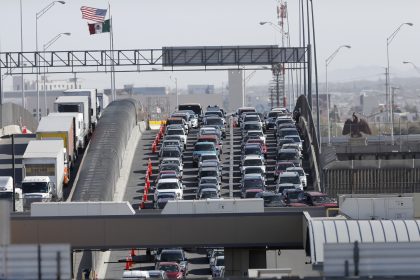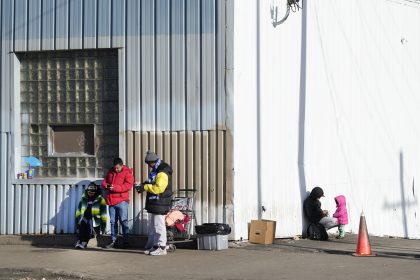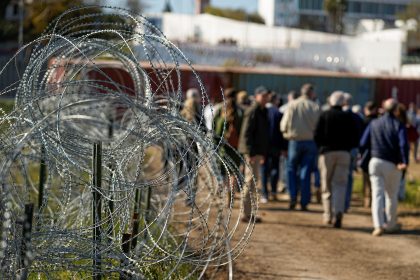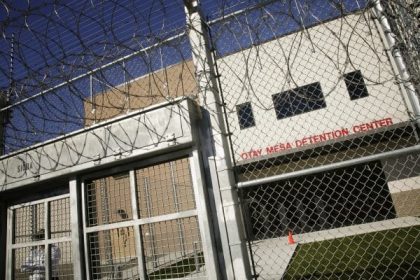Asylum Seekers at U.S. Mexico Border, A ‘Population in Peril’

CAMBRIDGE, Mass. – Well before the pandemic, migrants at the northern Mexican border were vulnerable to poor health outcomes. Mexican and U.S. policies put in place before COVID-19 affected migrants’ quality of life, and policies added during the health crisis may have put asylum seekers and migrants at additional risk.
On the same day that the Harvard Global Health Institute launched its new report, “A Population in Peril: A Health Crisis Among Asylum Seekers on the Northern Border of Mexico,” the Institute gathered immigration policy and public health advocates for an online discussion of how U.S. and Mexican immigration policies may be exacerbating the most pressing health risks of migrants and to suggest actions needed to protect asylum seekers’ health and human rights.
The HGHI report is composed of data collected by NGOs and testimonials from people living on the border. According to the Institute, it is meant to be a launch point for discussion, a catalyst for change, and a central place to find essential information on the health of these vulnerable populations.
“We started writing this report in a really different time than now… yet even now, this report couldn’t be more relevant,” said Megan Diamond, HGHI assistant director of programs and innovation, who said that simply reaching the border with the hope of entering the U.S. was not enough.
“Our findings provide a glimpse into the tremendous health burden that asylum seekers and migrants face every day,” Diamond said. “It highlights how… policies created this health crisis and led to a bottleneck of migrants waiting indefinitely in cities that lack the resources to care for them.”
On March 20, 2020, the U.S. announced that it would be limiting nonessential travel across U.S. land borders and that Customs and Border Patrol would no longer detain illegal immigrants in holding facilities, but rather would be directed to immediately return aliens to the country they entered from – Canada or Mexico — or, where such a return was not possible, to their country of origin.
This ‘Remain in Mexico’ policy led to an overcrowding of asylum seekers forced to wait out the pandemic in Mexico until their claims were qualified. And despite a health exception to the protocol, it appears that requests for health exceptions to asylum are being denied while the pandemic continues.
Mass deportation from the U.S. has its early history in an Eisenhower-era program designed to root out undocumented Mexicans. Family detention centers were largely built under the Obama Administration. And the current U.S. Migrant Protection Protocols — or those policies for returning to Mexico certain foreign individuals seeking admission to the U.S. from Mexico to wait out the duration of their immigration proceedings — are based on statutes signed into law by President Clinton.
“As we reflect on this history, what strikes me is this tradition of inhumanity we’ve built on, and that people are trying to persevere in this heightened precarity,” said Joanna Williams, director of education and advocacy at the Kino Border Initiative in Nogales, Arizona/Mexico. Williams is also concerned that coronavirus is being “used as an excuse” by anti-immigrant groups. She said, “because the U.S. government doesn’t recognize that fleeing for your life is essential travel.”
More than ever, “seeking safety at the U.S. border is like stepping onto a land mine,” said Olga Byrne, director of Immigration at the International Rescue Committee. Outlining that the journey to arrive at the border is harsh, difficult, and often violent, she added that conditions aren’t necessarily better once a migrant arrives at a northern Mexican border town.
According to Byrne, services and resources are extremely limited in northern Mexico, and while non-profits and advocacy groups have stepped in to help, Mexico’s system is ill-equipped to handle the capacity and meet the basic needs of these migrant populations, much less protect them from COVID-19.
Housing may be inaccessible or inefficient, shelters and tents are cramped, sanitation is poor, and crime rates are high. This continued trauma exacerbates untreated physical and mental health conditions. Under COVID-19, risks aren’t new, but they are heightened.
“[The discussion and HGHI report] adds a desperately needed perspective to the ongoing — and I would say long-standing — human rights crisis at the Mexico, U.S. border,” said Byrne. “It’s a public health crisis, a human rights crisis, and a public policy crisis all in one.”
“We’re meeting immigrant’s pleas… not with humanity, but with increasingly harsh immigration controls,” Byrne insisted, though she doesn’t believe that a change in administration will be enough to create lasting change. “We need to hold all U.S. administrations to a much higher standard.”
The HGHI report is preliminary to this discussion and calls for bi-national governmental action. Among the report’s recommendations are: to put a stop the U.S. MPP program; to reinstate family case management; to proactively coordinate NOGs and charities; and to create a temporary registration system that also registers a person’s health..
“We tend to think of the border as being this dangerous place, but actually it is a microcosm of… the precarity we are all facing during the pandemic,” said Jacqueline Bhabha, event moderator and Professor of the Practice of Health and Human Rights at the Harvard T.H. Chan School of Public Health. “[The northern Mexico border is] not an isolated hellhole in the middle of Elysian Field, but an acute example of the product of inequities.”























